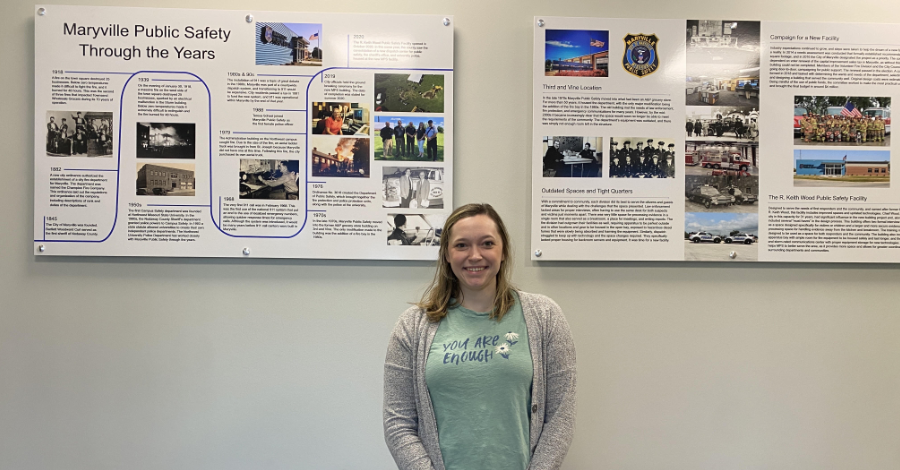 Northwest Missouri State University alumna Emily Tillman Hougland is advancing her education and interest in public history with foundational skills and profession-based experiences she gained at the university.
Northwest Missouri State University alumna Emily Tillman Hougland is advancing her education and interest in public history with foundational skills and profession-based experiences she gained at the university.
Hougland obtained a bachelor’s degree in history at Northwest last year and now is completing her first year at Middle Tennessee State University (MTSU) in Murfreesboro, TN, to pursue a master’s degree in public history with an emphasis in museum studies and management.
“I’ve always had a passion for history, and I wanted to be able to share that passion with others,” Hougland said. “Not necessarily in a classroom setting like as a teacher, and I wasn’t sure how to do that. Public history was that answer for me, and my goal is to work in museums. I love to do the research and put together the exhibits.”
Hougland based her decision to attend Northwest on her academic interests and the opportunities it provided in public history as well as her family ties. One of her aunts is a Northwest alumna, and she has grandparents who were born and raised in Maryville, Carolyn Mitchell Tillman and the late Milton Tillman.
At Northwest, Hougland honed her skills and knowledge, not just through her coursework, but as a member of the History Club, a resident assistant at Millikan Hall and a distribution intern at the Materials Distribution Center. She also completed an internship with the Andrew County Museum in Savannah.
“I really enjoyed my four years there, and it was over a lot quicker than I thought it would be,” she said. “Time went by real fast, especially when the pandemic hit, but I made lifelong friends, met my husband there and I love Northwest.”
Now, Hougland’s work is on permanent display in Maryville’s R. Keith Wood Public Safety Facility.
Hougland consulted with Maryville Public Safety personnel to complete the exhibit, which details the organization’s history dating back to the beginning in the 1800s. The exhibit consists of two large panels and one smaller photo panel. The first of the large panels is a timeline featuring significant events in the history of the department and photos to accompany the events. The second panel focuses on the process of getting the new public safety building along with more pictures. This panel is broken into four sections; the first describes the old public safety building and its history, the second describes the needs of the department and how they outgrew the old facilities, the third describes the process of getting approval to begin construction on the new facility, and the fourth describes the new facility and the advantages it provides for the city. The smaller panel is titled “Building in Progress” and shares three photos of the facility being built. The multi-year project involved Hougland interviewing Maryville Public Safety staff as well as reviewing Nodaway County Historical Society Museum and city records.
“It was really fun to create something,” Hougland said. “I spent a morning just digging through newspapers in the basement of City Hall.”
Hougland credits Northwest’s local history practicum with Associate Professor of History Dr. Elyssa Ford for preparing her with the research and investigative skills she applies to her graduate studies.
“I learned a lot, specifically with public history,” Hougland said. “I feel like I was well prepared for grad school. I’ve been able to take a lot of the skills that I learned related to public history, use them and further them in my graduate studies right now, and I attribute a lot of that to the professors that I had at Northwest.”
At MTSU, Hougland secured a graduate assistantship at the Albert Gore Research Center, where she processes collections of historical memorabilia. During her first semester, she worked with a classmate to create the “Preserving the Bottoms,” a podcast that highlights Bottoms, an African American community in Murfreesboro. The podcast features interviews with residents about growing up and living in the community.
“Telling history is so important,” Hougland said. “I love being able to really dive into research and learn as much as I can about something, but then I also want to share that with as many people as I can. Making sure that people are aware of what has happened in this country, learning from it and moving forward is why I believe public history is extremely vital.”




Facebook Comments